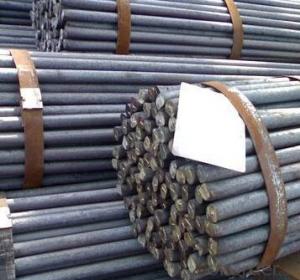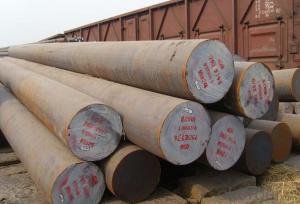Special Steel 42CrMo/1.7225 Working Mould Steel
- Loading Port:
- China main port
- Payment Terms:
- TT or LC
- Min Order Qty:
- 25 m.t.
- Supply Capability:
- 10000 m.t./month
OKorder Service Pledge
OKorder Financial Service
You Might Also Like
Item specifice
The details of our Steel
1. Produce Standard: as the GB, AISI, ASTM, SAE, EN, BS, DIN, JIS Industry Standard
2. Produce processes: Smelt Iron -EAF smelt Billet - ESR smelt Billet -Hot rolled or forged get the steel round bar and plate
3. Heat treatment:
Normalized / Annealed / Quenched+Tempered
4. Quality assurance:
All order we can received Third party inspection, You can let SGS, BV,.. and others test company test and inspect our products before Goods shipping.
Product information
Chemical Composition(%)
C | Si | Mn | Cr | Mo | Ni | P | S |
0.38-0.45 | 0.17-0.37 | 0.50-0.80 | 0.90-1.20 | 0.15-0.25 | ≤0.030 | ≤0.030 | ≤0.030 |
Standard
GB | AISI | DIN | JIS | ISO |
42CrMo | 4140 | 42CrMo4 | SCM440 | 42CrMo4 |
Available Size
Rolled round bar | φ20-120mm × L |
Forged round bar | φ130-195mm × L |
Heat Treatment
Item | Temperature℃ | Hardness |
quenching | 840-880 | HRC32-34 |
tempering | 580 | |
quenching | 900 | HRC54-60 |
tempering | 150-180 |
Applications: The steel is suitable for manufacturing requires a certain strength and toughness of large and medium-sized plastic mold
Product show

Workshop show

- Q:What are the future trends and innovations expected in special steel production?
- In the future, several trends and innovations are expected to shape the special steel production industry. Here are a few key areas where advancements are likely to occur: 1. Advanced Manufacturing Techniques: Special steel manufacturers are likely to adopt advanced manufacturing techniques such as additive manufacturing (3D printing) and digitalization. These technologies will facilitate the production of complex geometries, reduce waste, and enable customization of special steel products. 2. Sustainable Production: As environmental concerns continue to grow, there will be a focus on sustainable production methods in the special steel industry. This includes the adoption of energy-efficient processes, recycling and reusing materials, and minimizing the carbon footprint of steel production. 3. High-Strength and Lightweight Alloys: With the increasing demand for lightweight materials in various sectors like automotive and aerospace, special steel production is expected to focus on developing high-strength and lightweight alloys. These alloys will offer improved performance while reducing the weight of components, leading to fuel efficiency and enhanced sustainability. 4. Nanotechnology and Microstructural Engineering: Nanotechnology and microstructural engineering will play a significant role in enhancing the properties of special steels. By manipulating the material at the nanoscale, manufacturers can improve strength, toughness, corrosion resistance, and other characteristics. 5. Enhanced Surface Treatments: Advances in surface treatments, such as coatings, will contribute to the performance and longevity of special steel products. Innovative surface treatments will provide increased resistance to wear, corrosion, and heat, expanding the range of applications for special steels. 6. Digitalization and Data Analytics: The integration of digital technologies and data analytics will revolutionize special steel production. Smart factories with interconnected systems will enable real-time monitoring, predictive maintenance, and improved quality control, resulting in higher productivity and efficiency. 7. Automation and Robotics: Automation and robotics will continue to play a vital role in special steel production. Automated processes will optimize productivity, reduce human errors, and improve worker safety, thereby enhancing overall operational efficiency. 8. Industry 4.0 Integration: The special steel industry is expected to embrace Industry 4.0 principles, such as the Internet of Things (IoT) and artificial intelligence (AI). These technologies will enable seamless connectivity, intelligent decision-making, and predictive analysis, leading to improved productivity, cost-effectiveness, and competitiveness. Overall, the future of special steel production is likely to be driven by advancements in manufacturing techniques, sustainable practices, material engineering, digitalization, and automation. These innovations will not only enhance the performance and quality of special steel products but also contribute to a more sustainable and efficient industry.
- Q:What's the difference between special steel and ordinary steel?
- Compared with ordinary steel, special steel has higher strength and toughness, physical properties, chemical properties, biocompatibility and process performance.
- Q:What are the different types of bearing steel?
- There are several different types of bearing steel, including high-carbon chromium steel, high-carbon chromium-molybdenum steel, and case-hardened steel.
- Q:What are the main factors affecting the corrosion resistance of special steel?
- The main factors affecting the corrosion resistance of special steel are the composition of the steel, the presence of alloying elements, the surface condition, the exposure environment, and the presence of protective coatings or treatments.
- Q:How is special steel used in the production of aircraft landing gear?
- Special steel is used in the production of aircraft landing gear due to its high strength, durability, and resistance to fatigue. It helps ensure the landing gear can withstand the stress and impact forces experienced during takeoff, landing, and taxiing. Additionally, special steel alloys are used to create components with precise dimensions and superior corrosion resistance, ensuring the landing gear performs reliably in various environmental conditions.
- Q:What are the different grades of special steel?
- There are several grades of special steel, including stainless steel grades such as 304, 316, and 430; tool steel grades like D2, O1, and A2; and high-speed steel grades such as M2 and M42. Each grade has unique properties and applications, making them suitable for various industries and specific purposes.
- Q:How does special steel perform in oil and gas applications?
- Due to its outstanding performance and superior properties, special steel is highly sought after and extensively used in oil and gas applications. The exceptional resistance to corrosion exhibited by special steel is crucial in environments where oil and gas are present, as it helps prevent equipment failure and guarantees the longevity and reliability of the components. In addition, special steel possesses remarkable strength and durability, making it capable of withstanding extreme conditions such as high pressure and temperature. This strength enables the steel to endure the demanding and harsh environments often encountered in oil and gas applications. Moreover, special steel retains its mechanical properties even at elevated temperatures, ensuring stability and reliability in these challenging conditions. Another notable advantage of special steel is its excellent weldability. This property allows for easy fabrication and assembly of components, reducing production time and costs. It also ensures the integrity of the structures and equipment used in oil and gas applications. Furthermore, special steel offers exceptional resistance to fatigue and wear, which are commonly encountered issues in oil and gas operations. The ability of special steel to withstand cyclic loading and abrasive conditions guarantees the longevity and reliability of the components, thereby reducing maintenance and replacement costs. Overall, special steel performs exceptionally well in oil and gas applications due to its corrosion resistance, high strength, durability, weldability, and resistance to fatigue and wear. These superior properties make it the preferred choice for critical components, ensuring the efficiency, safety, and reliability of oil and gas operations.
- Q:How is special steel machined?
- Special steel is machined using various methods and techniques, depending on the specific requirements and properties of the steel. One common method is turning, where a cutting tool is used to remove material from the rotating steel workpiece. This process is used to shape the steel and create cylindrical parts such as shafts or rods. Another method is milling, which involves using rotating multi-point cutting tools to remove material from the steel workpiece. This process is used to create flat surfaces, slots, or complex shapes on the steel. Grinding is also commonly used to machine special steel. It involves using abrasive wheels to remove material and create a smooth surface finish. This method is often used for precision machining, where tight tolerances and smooth finishes are required. Drilling is another important machining process for special steel. It involves using a rotating drill bit to create holes in the steel workpiece. This process can be done manually or using CNC (Computer Numerical Control) machines for precise and accurate hole placement. In addition to these methods, special steel can also be machined using other techniques such as broaching, honing, or lapping, depending on the specific requirements and desired outcome. It is important to note that machining special steel requires specialized tools, equipment, and expertise due to the material's hardness and unique properties. The cutting tools used for machining special steel are often made from high-speed steel or carbide, which can withstand the high temperatures and pressures generated during the machining process. Overall, machining special steel involves a combination of cutting, grinding, and drilling techniques to shape, refine, and finish the steel workpiece according to the desired specifications and requirements.
- Q:How does special steel contribute to the manufacturing of industrial machinery?
- Special steel plays a crucial role in the manufacturing of industrial machinery by providing superior strength, durability, and resistance to extreme conditions. It allows for the construction of components that can withstand heavy loads, high temperatures, and corrosive environments, ensuring the reliability and longevity of the machinery. Additionally, special steel's unique properties enable the production of precise and intricate parts, enhancing the overall performance and efficiency of industrial machinery.
- Q:How does special steel perform in extreme weather conditions?
- Special steel is specifically designed to have enhanced performance in extreme weather conditions. It exhibits exceptional strength, durability, and resistance to corrosion, making it highly suitable for withstanding harsh environments such as extreme heat, cold, humidity, and strong winds. Additionally, special steel maintains its mechanical properties and structural integrity even under extreme temperature variations, ensuring its reliability and longevity in adverse weather conditions.
1. Manufacturer Overview |
|
|---|---|
| Location | |
| Year Established | |
| Annual Output Value | |
| Main Markets | |
| Company Certifications | |
2. Manufacturer Certificates |
|
|---|---|
| a) Certification Name | |
| Range | |
| Reference | |
| Validity Period | |
3. Manufacturer Capability |
|
|---|---|
| a)Trade Capacity | |
| Nearest Port | |
| Export Percentage | |
| No.of Employees in Trade Department | |
| Language Spoken: | |
| b)Factory Information | |
| Factory Size: | |
| No. of Production Lines | |
| Contract Manufacturing | |
| Product Price Range | |
Send your message to us
Special Steel 42CrMo/1.7225 Working Mould Steel
- Loading Port:
- China main port
- Payment Terms:
- TT or LC
- Min Order Qty:
- 25 m.t.
- Supply Capability:
- 10000 m.t./month
OKorder Service Pledge
OKorder Financial Service
Similar products
New products
Hot products
Related keywords





























